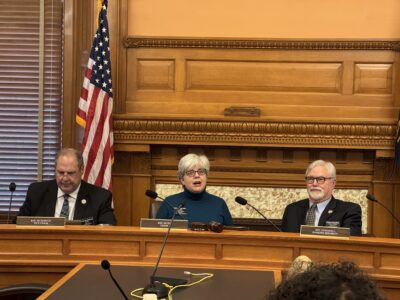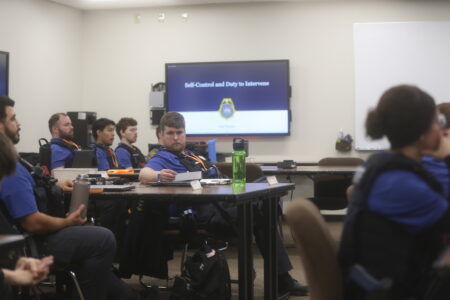KU’s Department of African and African-American Studies celebrates 50 year anniversary during pivotal time in history

photo by: Contributed/University Archives, Kenneth Spencer Research Library
The title page of the bylaws to the African and African-American Studies department at the University of Kansas. The department celebrated its 50th anniversary in late August.
Fifty years ago, the University of Kansas was uniquely positioned at the beginning of the initial push in the United States to create educational programs dedicated to studying the history and impact of the experiences of Black people.
While the first Black studies program at a university was formed at San Francisco State University in 1969, a year prior, courses were already being taught at KU on Black history and Black culture — which coincided with a student-led effort to integrate similar curriculum into Lawrence’s K-12 school system.
Black students at KU formed a student union in 1968, and those students took the lead on teaching courses at the university and in the Lawrence community, and pushed university officials to adopt a Black Studies department.
After a tumultuous spring and summer in 1970 — which included the firebombing of the Kansas Union and the killing of Rick “Tiger” Dowdell, a Black KU student, by a Lawrence police officer — KU gave final approval for the creation of an African Studies department in July.
And on Aug. 25, 1970, the department approved its bylaws, which current chair Shawn Leigh Alexander said he uses as the official date of the department’s founding. Just past a half century later, Alexander marvels at the uniqueness of how KU’s now-African and African American Studies department was founded.
Not only do people not typically associate Kansas with the initial wave to promote and integrate Black studies into public education, but KU’s department was special because it came about almost entirely due to the activism of both high school and college students.
It also was firmly established as an active university department — which hires its own faculty and controls its own curriculum — rather than a Black studies program, an avenue which many universities opted for at the time, he said.
“This is happening exactly at the moment that it’s happening throughout the rest of the country,” Alexander said. “On some levels that’s a unique thing about the creation of the department at the University of Kansas is its connection and unification with the activism of high school students that matriculate up to the university.”
After the department was approved at the university level, it hired its first chair in Jake Gordon, who stayed in the leadership role for a decade until he retired from the chair role in 1980. Afterwards he stayed in the department for another 24 years before retiring in the mid-2000s. Now in his 80s, Gordon said the anniversary of the department’s founding is a key milestone in KU’s history.
In an email to the Journal-World, Gordon said he remains grateful to those who welcomed him to Mount Oread and helped with the massive undertaking of launching a new department in a time of great societal upheaval.
“I am eternally indebted to their support in building a strong foundation for the department which has endured and achieved academic excellence and recognition,” Gordon said. “The 50th anniversary also means an opportunity to explore strategies for moving forward to meet new, present and future challenges, especially in the age of (the) COVID-19 pandemic and national political uncertainty.”
Fifty years on, the African and African-American Studies department at KU is perhaps more relevant now than ever before. 2020 has seen nationwide protests erupt after repeated instances of police violence and killings of Black people, as well as an unprecedented global health crisis that has disproportionately affected people of color.
Nicole Hodges Persley, an associate professor in the department, told the Journal-World she was thrilled to work in African and African-American studies during not only a pivotal milestone for KU’s department, but for the United States as a whole.
“In our current climate (with) daily reminders of pervasive racial violence in the United States, African Studies departments become vital to the intellectual landscape of universities in America and abroad,” she said.
“I am hopeful that on this 50th anniversary of African and African-American Studies at KU that students, faculty, and staff across the campus from every discipline will seek to learn more about the social justice role that African American Studies played on KU’s campus,” Hodges Persley said.
With the racial unrest that has risen to the surface in 2020, Alexander said it again highlights the importance of Black Studies departments who continually study and write not only about the origins of Black experiences dating back centuries, but the impact those experiences have in modern society.
KU’s department, for example, offers interdisciplinary courses on today’s Black humor, Black love, and Black culture. Despite common perception, African and African-American Studies departments don’t only study the resistance or reaction to societal shifts, Alexander said, but are constantly working to piece together the enduring impact Black history has on the world’s events.
That’s why it can sometimes be frustrating, he said, when years like 1970 or 2020 come along and society writ large comes to Black Studies scholars asking how to fix current crises.
“My frustration with that mindset is that racism, the disparities … white supremacy does not go away. It may not be on the nightly news, it may not be on the front page of the newspaper, but it’s always been there,” Alexander said. “…And then they disappear when it’s no longer a hot topic in the news. And the Black Studies departments continue to do what they’ve always done.”
When asked if 2020 could finally be a turning point in seriously addressing systemic racial inequities in American society, Alexander recited a quote from W.E.B. Du Bois, a renowned Black scholar and author of whom Alexander penned a biography in 2015.
“I’m an optimist, but I have eyes.”
“We were asked the same thing in 2015 (during the Ferguson, Missouri protests). We were asked the same thing in 1970 when this department was created. I think the understanding is that Black Studies is consistently here trying to explain to people what is going on,” Alexander said, elaborating on Du Bois’ sentiment.
“What we’re asking people to do is listen to us,” he said. “I think the turning point will come about when institutions and people really begin to listen to African and African-American scholars about what is going on.”
The department was set to celebrate its semicentennial anniversary this fall, but had to postpone festivities due to the COVID-19 pandemic, Alexander said. He encouraged the KU community to keep an eye out for a spring event and a “proper celebration of this momentous milestone.”
Contact Conner Mitchell
Have a story idea, news or information to share? Contact KU reporter Conner Mitchell:
- • Email: cmitchell@ljworld.com
- • Other: Tip form/Signal contact
- • Phone: 785-832-6388
- • Twitter: @ConnerMitchell0
More Lawrence Journal-World coverage of the University of Kansas







